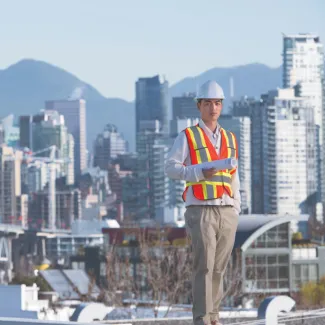A human-centred approach to infrastructure planning and investment

By Martino Tran, Associate Professor in the School of Community and Regional Planning, Principal Investigator of the Urban Predictive Analytics Lab, Canada Research Chair in Computational Urban Science and Planning, and instructor and former co-director of the MEL in Urban Systems We are facing two significant challenges – the climate crisis and inequality – that are having profound impacts on our cities.
More than 90 per cent of the world’s population is expected to make their home in cities over the next 30 to 40 years, making an already acute problem even more challenging.
Cities are disproportionately responsible for climate change (urban centres consume three-quarters of the world’s energy and produce 60 percent of greenhouse gas emissions) and they also face some of the most severe impacts of a changing climate. Rising sea levels, for example, will affect many of the world’s cities located along vulnerable coastlines, often in countries that have the fewest resources available for measures to mitigate and adapt to the impacts of a changing climate.
Human-centred city planning
The growing urbanization of our planet reflects the fact that cities are attractive because they are associated with increased opportunities and quality of life.
On aggregate, we know that this is true when measured by average household income and other indicators. Yet we also know that the gap between rich and poor is far worse than it was 50 years ago. For those of us working in urban planning and infrastructure, finding innovative ways to address the challenges of climate change and inequality is a top priority.
That’s why it is so crucial to take a human-centred approach to infrastructure planning and investment.
This means broadening our understanding of infrastructure beyond physical assets such as transportation networks, the electricity grid and water distribution. We also need to look at the technological and social networks – at the places and spaces in a city that impact our quality of life as well as the services like schools, hospitals and community centres that allow for community interaction and play a crucial role in improving quality of life.
We must look at changing demographics and respond by putting in place the infrastructure and essential services to meet those changes.
That could include, for example, adding new bus routes to meet the needs of a large youth or elderly demographic, or exploring autonomous vehicle shuttles to improve accessibility for households in the most need.
Leaders for Sustainable and Equitable Urban Infrastructure
The Master of Engineering Leadership (MEL) in Urban Systems is an interdisciplinary program that brings professionals together to explore these pressing issues. Students come from engineering, urban planning, geography and other backgrounds, and within this interdisciplinary environment, they learn new ways of thinking.
Courses integrate the outcome-based training we might associate with engineering with the process-based training often common in architecture and urban planning.
Throughout, there is an emphasis on situating this work within the broader social and environmental context. Many courses have an applied component, where students connect with stakeholders from industry or government to work on a project.
These experiences prepare our graduates to be leaders.
Our industry partners tell us time and again that they need employees whose technical expertise is matched by their ability to communicate effectively and lead across different domains. Leaders in urban systems must understand many different domains and understand how these domains are interconnected and influence each other.
They must appreciate how each discipline brings strengths to the table for tackling these complex system-wide challenges.
I believe the MEL in Urban Systems provides a valuable training ground for the leaders of tomorrow who can develop and implement the people-centred infrastructure projects that could transform our cities into more sustainable and equitable places.






